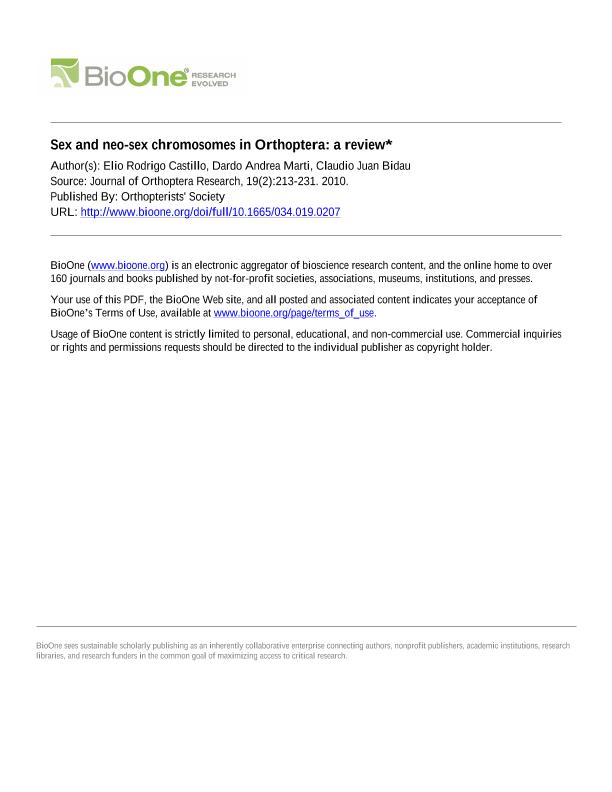Artículo
Sex and neo-sex chromosomes in Orthoptera: a review
Fecha de publicación:
12/2010
Editorial:
Orthopterists' Society
Revista:
Journal Of Orthoptera Research
ISSN:
1082-6467
Idioma:
Inglés
Tipo de recurso:
Artículo publicado
Clasificación temática:
Resumen
We review historical and pioneering work as well as recently published papers about orthopteran sex chromosomes and neo-sex mechanisms, highlighting Michael White's significant contributions. Meiotic research in Orthoptera in the early twentieth century was central to confirming that sex determination had a chromosomal basis: the study of sex chromosomes produced fundamental support to the chromosome theory of heredity. We also explore recent theoretical models of sex-chromosome evolution and consider the possible causes of crossing over restriction in proto-sex chromosomes, as well as the progressive differentiation (erosion and degeneration) of the Y chromosome in neo-chromosome systems in different taxa. We discuss neo-XY and neo-X1X2Y chromosome systems of South American Melanoplinae (Acrididae) as potential experimental models to study steps in sex-chromosome evolution because these systems fall within a continuum of evolutionary stages, some of them recently established. We also provide an explanation for the disproportionate frequency of neo-sex systems and Robertsonian-derived karyotypes in Neotropical Melanoplinae, based on the centromeric drive theory, and propose that Neotropical melanoplines' high karyotypic diversity supports an ancient South American origin of the subfamily. We discuss the hypothesis that neo-sex chromosome systems produce favorable new linkage relationships between genes in the X and the involved autosome, some of which could be sex determination related, creating a new balance between sex chromosomes and autosomes. We also review Mesa's hypothesis that, based on the observed fact that no major taxon of orthopterans shows neo-sex chromosomal mechanisms in all their species, the acquisition of a neo-sex chromosome system could condemn species of grasshoppers to a short evolutionary career. Little is yet known about the role of neo-Y chromosomes in Orthoptera, thus mostly speculative explanations about neo-sex chromosome function can be made at present. New studies with modern molecular techniques are needed to understand chromosomal sex determination in Orthoptera, which could in turn help explain the role of new chromosomal sex systems in grasshopper species.
Archivos asociados
Licencia
Identificadores
Colecciones
Articulos(CCT - NORDESTE)
Articulos de CTRO.CIENTIFICO TECNOL.CONICET - NORDESTE
Articulos de CTRO.CIENTIFICO TECNOL.CONICET - NORDESTE
Citación
Castillo, Elio Rodrigo Daniel; Marti, Dardo Andrea; Bidau, Claudio Juan; Sex and neo-sex chromosomes in Orthoptera: a review; Orthopterists' Society; Journal Of Orthoptera Research; 19; 2; 12-2010; 213-231
Compartir
Altmétricas




